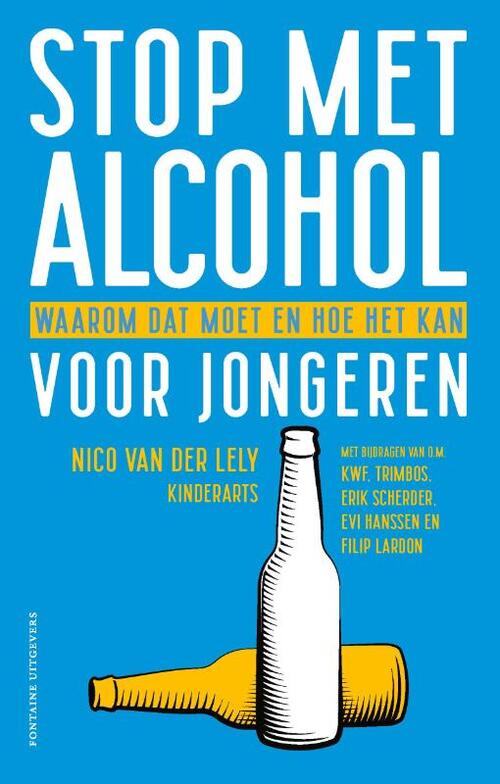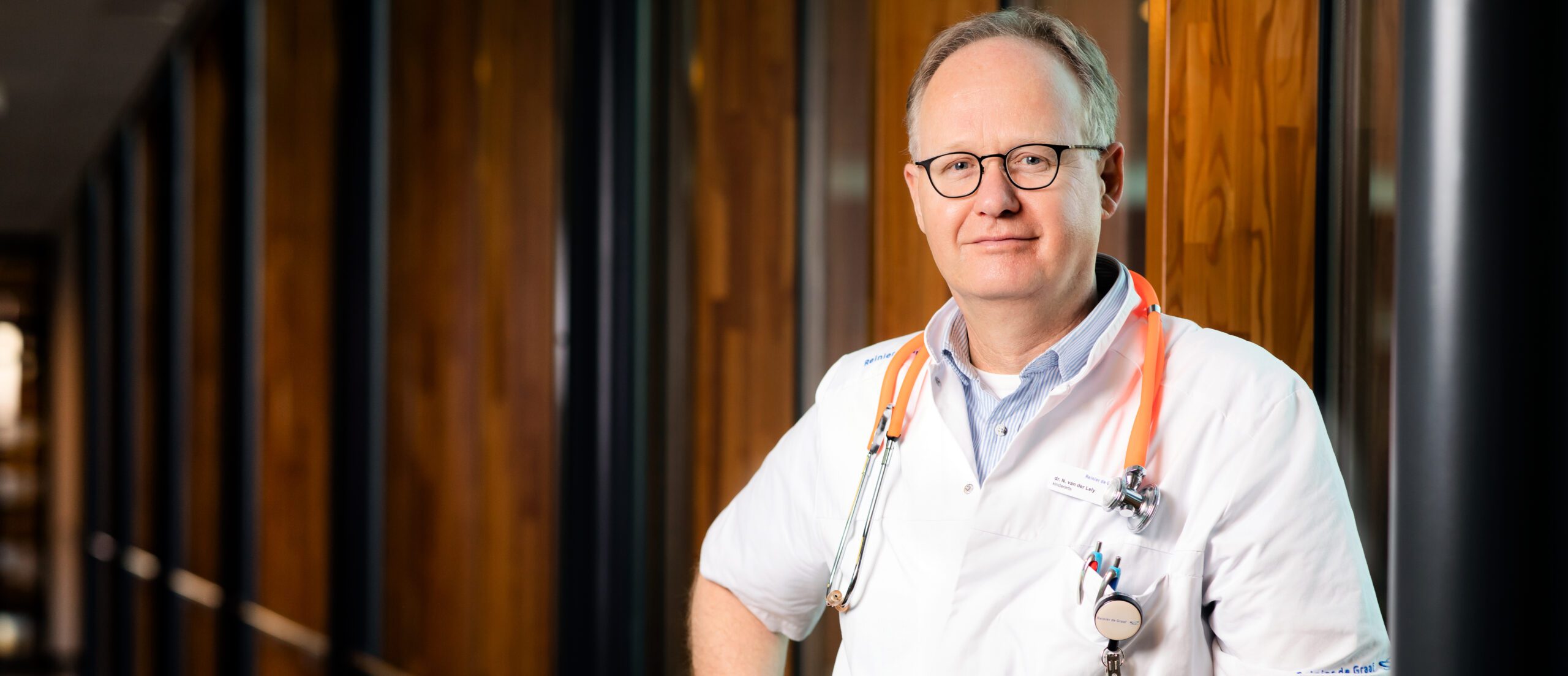‘No alcohol for young people’. That’s the descriptive title of Nico van der Lely’s new book. The Delft paediatrician is still seeing too many students with alcohol poisoning at his hospital alcohol department. “Getting drunk has become a competition.”
Pediatrician Nico van der Lely: “Beer instead of spirits is part of the solution.” " (Photo: Frank van der Burg)
OWee. The ambulance workers bring an 18 year old young woman to the alcohol department of the Reinier de Graaf Gasthuis hospital in Delft. Alcohol coma. Her mentor, also far from sober, like she herself has no idea what happened. Nico van der Lely, paediatrician and founder of the alcohol department, phones her parents. They are apparently not prepared to cut short their holiday for their drunk daughter. “They seem to think that when their kid leaves home, they are ready for the big wide world,” says Van der Lely. “Nonsense.”
The young woman recovered, at least in the short term, says Van der Lely. But in the longer term you can never know what damage an alcohol overdose may cause, says the doctor. “If you hadn’t done it, you may have been smarter, or never have got cancer later in life. We simply do not know what the long-term damage is of so much alcohol in one evening. But we do know that it causes permanent damage.”
This is just one of his reasons to argue for less, much less, alcohol. He does not want to hear about any alcohol consumption under the age of 18, as his new book entitled ‘Stop met alcohol voor jongeren’ (‘no alcohol for young people’, not available in English) makes clear. To the over 18s in TU Delft student life, he devotes a whole chapter. His call to them is to stop drinking spirits.
Why is this necessary?
“All the serious cases that we see at the alcohol department are caused by drinking spirits. The people who come to us would not have had to come there if they had stuck to just beer. We really see horrible things. A 16 year old walked down the motorway drunk and did not survive. A 23 year old man tried to bash up a café. Sexual abuse after alcohol takes away everyone stops. An incredible number of incidents are related to alcohol abuse in one way or another.”
You write that this was not so extreme in your student time. What has changed?
“When I was studying, I did drink beer. Other alcoholic drinks were not available. These days students drink jenever (a type of Dutch gin) and rum and cokes. Before, you would have only a beer or two at the student association, but now it’s a competition to see how drunk you can get. Alcohol is everywhere in student life. I even saw shot glasses among the student stuff at the Hema department store. That really is going too far, isn’t it?
But it starts before that, at students’ family homes. If the parents open a bottle of wine every day, their children will think that this is normal. We know from research that if parents drink a lot, their children will also be more prone to doing so.”
Are there any other factors?
“Previously the association board members were a lot older than most of the members. You studied for seven or eight years, and only took on a position of responsibility in your association when you were well in your twenties. The age difference was then big enough to have authority.
But now students have to be done more and more quickly. This means that the board members and OWee mentors are only about 21 years old, while your brain is only fully developed after you are 23! This means that it is children telling children that they have to be restrained with alcohol consumption.”
‘I hope that students will ultimately go back to “just” drinking beer’
Are you hoping for a total ban on spirits at student associations?
“I hope that students will ultimately go back to ‘just’ drinking beer. But we need to deal with this more cleverly than imposing a ban. If a student association is not permitted to sell spirits anymore, no one will come. They’ll all just go and drink in student houses. Then they will be entirely out of sight.
So at TU Delft we are trying to bring about a change in culture from the bottom up. There will then not be anyone that says ‘this is not allowed’, but it will be supported throughout the student community. The student board members of the major student associations, the mayor and TU Delft are all at my table. The idea now is that other student cities also follow suit.”
What concrete measures are arising from the TU Delft approach?
“The student associations that have joined have opened up their contracts with the drinks suppliers. Student associations are largely dependent on their bar turnover, and they earn more from spirits than from beer. The business model needs a complete overhaul. We are working on what this will be.”
So everyone will drink beer instead of spirits?
“Beer instead of spirits is part of the solution. But you also want to make it more acceptable to not drink alcohol at all. Three years ago you were seen as a loser if you stood in the corner with a bottle of 0.0% beer in your hand. Now several TU Delft student associations have alcohol free beer on tap so you don’t see the difference between beer with or without alcohol anymore. This has led to a lot more alcohol free beer being drunk.
Things are going in the right direction at TU Delft. As things move so quickly while you are studying, things can change fast. In one example, at the alcohol department in the hospital, we see the effect of the drinking age limit that was raised in 2014 (before then you could drink alcohol at 16 years of age, now it’s 18 years, Eds.). There are far fewer young children suffering from alcohol poisoning. This continues if they start studying.”
What is a common drinking pattern among TU Delft students?
“That really depends on the individual. If your basic health condition is good, you can cope with more. Boys tend to break down alcohol better than girls, and because of a different enzyme, Asians tend not to handle alcohol well. So I’ll say it differently. If you do not get drunk, do not need to go to hospital, study well, and are not dependent on alcohol, there is little amiss.
But if you only drink beer, you will not go too far quickly. It is not bad if you drink an occasional beer while studying, or even if you drink a little too much once in a while. It is a phase in which you learn to handle alcohol. But in the bigger picture, I think we should see alcohol as something special. That you do not drink every day, but once in a while at special occasions.”
Do you, the country’s advocate for a stricter alcohol policy, drink occasionally?
“I drink a beer once in a while. But not that much and not that often.”
 Nico van der Lely, Stop met alcohol voor jongeren. Waarom dat moet en hoe het kan (Fontaine Publishers, 2024)
Nico van der Lely, Stop met alcohol voor jongeren. Waarom dat moet en hoe het kan (Fontaine Publishers, 2024)
(No alcohol for young people. Why this is necessary and how it can be done).
Only in Dutch
Prof. Nico van der Lely (1963) is a paediatrician at the Reinier de Graaf Gasthuis Hospital in Delft. He founded the first Youth & Alcohol department there in 2016. There are now 12 departments across the country.
Through his Jeugd & Alcohol (youth and alcohol) foundation, Van der Lely was the initiator of the Delft alcohol covenant in 2018 in which TU Delft social associations made agreements to reduce alcohol consumption. He also arranges an annual alcohol symposium for students.
Van der Lely is also a professor at the University of Antwerp and has written two books called Onze kinderen en alcohol (our children and alcohol) and De alcoholvrije puber (the alcohol free teenager).



Comments are closed.